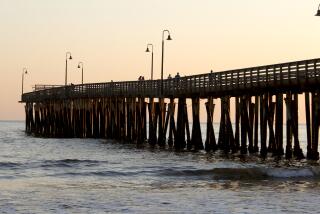Oceanside Buys, Closes Nude Dance Club
- Share via
OCEANSIDE, Calif. — Downtown has taken a giant step closer to shedding its notorious reputation as a honky-tonk for off-duty Marines and sailors.
No more will there be a Playgirl Club, which for four decades allowed even underage military personnel from nearby Camp Pendleton to drink soda pop and go bug-eyed looking at buck-naked women.
At a ceremony last week, cheers came from city officials who had tried for 20 years to convince Playgirl owner Edward “Skip” Arthur to sell.
Finally they made Arthur an offer he could not refuse: $700,000 for the property and another $700,000 for promising not to open another nude entertainment establishment elsewhere in town.
At 68, Arthur and his wife, Jeanne--”She’s my boss”--say they are ready to slow down.
Tears, on the other hand, came from two young dancers--stage names Nadia and Jessie--who watched as Mayor Terry Johnson and City Council members Jack Feller, Betty Harding and Carol McCauley took turns being hoisted aloft by a cherry picker to paint over the Playgirl sign.
“The dancers were like family,” said Nadia, 23. “And the young Marines were always polite. No touching, no nasty stuff. Not like those businessmen at the club where I worked in Sacramento.”
“It’s all very sad,” said Jessie, 18. “The Marines are just boys and they weren’t hurting anybody by coming here to listen to the jukebox and watch us dance without our clothes on.”
Maybe not, but an establishment that advertises “Totally Nude Dancers” and “Girls Girls Girls” is not what Oceanside wants for its rapidly upscaling downtown as it attempts to draw tourists and home buyers with beach-close condominiums that routinely fetch $500,000 apiece.
Already the city has had feelers from people interested in opening a restaurant, retail outlet or comedy club once the site is renovated.
Slowly the downtown Oceanside of old, which police once branded a combat zone, is disappearing.
“I came here in the 1980s and the prostitutes were everywhere,” Harding said. “We got to know their names. Now they’re gone, or at least invisible. This is not the same city it was.”
Gone are the tattoo and massage parlors, sawdust-floor bars and locker clubs that once dotted the blocks around the Greyhound bus station.
Even Jughead’s, a Marine-friendly bar that a self-described “tough old broad” named Rosemary “Mom” Hamilton ran with an iron fist, has been replaced by a trendy restaurant.
The late Gustav Hasford, the ex-Marine whose book “The Short-Timers” became the movie “Full Metal Jacket,” also wrote about his off-duty time at Camp Pendleton in the 1970s in a book titled “A Gypsy Good Time”:
“The civilian slop chute off base was called Oceanside, a pocket paradise of institutionalized sleaze, fertile soil for bad country and western bands and cheap-ugly women. Outside the bus station in a hot night, marijuana dealers and pimps open for business were strutting up and down the broken white line in the center of the street.”
Signs of change are everywhere on the palm tree-lined streets. A movie house that once specialized in X-rated features is now being used by community theater groups, one soon to offer a production of the Restoration comedy “The Rivals.”
Computer stores, pizza parlors, T-shirt shops and curio stores are sprouting. A surf museum and an art school are popular. There are still quickie laundries and uniform and equipment stores that cater mostly to Marines, but the City Council has sought to discourage further “personal service” businesses.
The Marine Corps at Camp Pendleton has done its part to erase the Hollywood image of brawling Marines and drunken sailors. More recreational opportunities are provided on-base and active-duty personnel are warned that off-duty misbehavior can mean an end to their careers.
To city officials, the Playgirl Club was a particularly obnoxious obstacle on the march to redevelopment, not because of what went on inside--police concede that Arthur actively discouraged drugs and prostitution--but because of its prime location.
The club, on Pier View Way, is two blocks from City Hall and smack in the middle of what the city hopes will be a popular promenade from downtown to the beach and pier.
“The demographics of downtown are changing,” said Jane McVey, director of the city’s economic development and redevelopment department. “The people buying the condos have incomes well above $100,000. They want to see Trader Joe’s or a nice bookstore, not a Playgirl Club.”
There already is a bookstore on the street, right next to the former Playgirl Club, but it is not the type that McVey and other officials have in mind: Midnight Adult Book, featuring X-rated fare.
Many of Playgirl’s 17 dancers now work at Deja Vu, a San Diego establishment near the Miramar Marine Corps Air Station.
The departure of the Playgirl Club leaves but one strip joint in Oceanside. But the Main Attraction, which, unlike Playgirl, sells alcohol, is several blocks from the heart of downtown and less visible. City officials have asked the owner about a possible purchase but have been rebuffed.
For a total of $1.5 million, which includes closing costs, the city took possession of the Playgirl furnishings, mostly chairs and tables that the city plans to donate to charity. The brass pole that featured prominently in many of the dancers’ routines disappeared at about the time escrow closed.
The mirrored ball was still above the dance floor when the politician-painters arrived Friday morning. Later, Mayor Johnson took the ball to his automobile for possible display at City Hall.
“Why do you get to take that?” Nadia asked. “You’re taking our memories with you.”
There was no immediate response.
More to Read
Sign up for Essential California
The most important California stories and recommendations in your inbox every morning.
You may occasionally receive promotional content from the Los Angeles Times.










